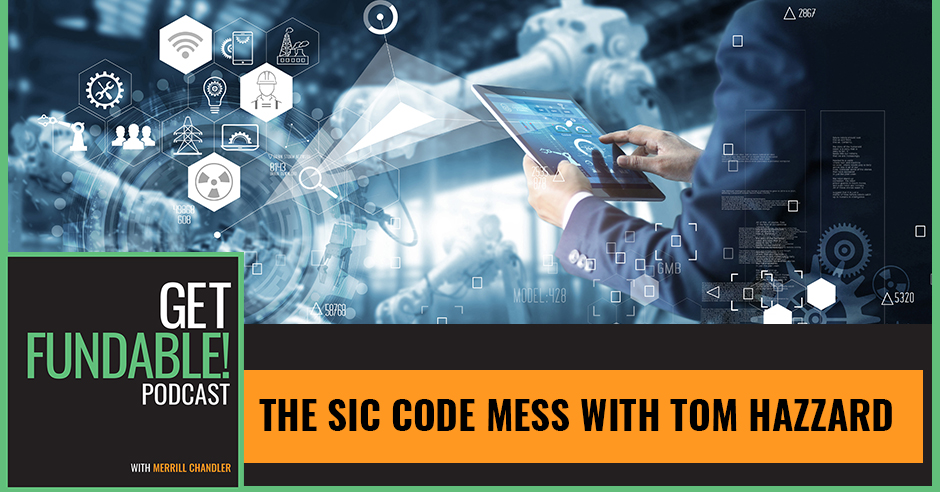
Tom Hazzard is the CEO and Co-Founder of Brandcasters, Inc, a podcast empire delivering an end-to-end service that produces, publishes, and promotes podcast shows. In this episode, Tom joins Merrill Chandler to talk about industry discrimination and the SIC code mess felt by businesses like Tom’s Brandcasters, Inc. With the current global health issue, it has become very crucial to learn how your business will get affected by it. Tom and Merrill discuss why businesses that fall under 75% of the world’s SIC codes are being denied funding. Furthermore, they also talk about the two industry classification systems and the importance of falling into fundable categories.
—
Watch the episode here:
Listen to the podcast here:
The SIC Code Mess With Tom Hazzard
This is going to trigger a whole bunch of awesome things for our Funding Hackers, our Get Fundable tribe for all entrepreneurs and business owners out there. My guest is Tom Hazzard. He’s coming out of the business funding trenches to report on late-breaking news. When you’re right, you’re right. I didn’t know how right I was. I knew we had dialed in this whole fundable, unfundable business model. We are so bullseye. We’ve split three arrows in a row on this thing. Let me tell you a little bit about Tom. Him, his wife and team have built our podcast empire. They produce, publish and promote everything that we’re doing. We’re almost 90 episodes on either published or on deck. Thank you so much. This episode is not about your genius as a podcaster, as a builder of empires. This is about your experience as a client and the experience you had in what you thought was going to be a piece of cake. Please tell me your story and tell our audience your story.
Merrill, thank you for having me on the show. It’s great to be back. I want everyone to understand while we certainly produce your show, we are also a client of yours. Your company is optimizing our credit profiles for fundability™. You do it all for us because I don’t have time to do that in my life. We’re a business. We’ve got about 60 total employees. We’ve been doing business for a few years. We’re established. We periodically will have either a line of credit or a business capital loan that will get to make cashflow easier at times.
A little more than a year, we’ve had two different working capital loans, not a line of credit, from QuickBooks Capital. We do all our accounting on QuickBooks and they make it easy to apply for a loan. The rates are pretty reasonable. These are like six-month term loans. You get them and you pay it back over six months. We’ve done this twice. It’s been a little over a year because we did one, then we did another with little gaps in between. We always paid as agreed on time, paid in full pay, perfect payment history, no problems.
Not even a missed payment that you had to make up within 30 days. It was stellar as stellar can be. Our latest one, the last payment was due to be made on March 16th, 2020, which is Monday. On March 13th, which is a Friday coincidentally, I get a phone call because I’m listed as the owner of the business. They called me and they said, “We see that you’re about to make your last payment on Monday. We want to let you know it will be about a day or two for that to process in the system and show through all of QuickBooks system that it’s paid off and you could apply for a new one.”
They’re inviting me to apply for another one. I talked with Tracy, my business partner and we’re like, “Should we do that? We got some bigger capital raise we’re doing here within 90 days, but there are some strategic things we need to do. It might be a little easier to have it. Sure, let’s apply for another one.” We’re talking about a $50,000 type line of credit. We apply. A couple of days later, we get the email that says we have been declined. I get this, “We’re unable to offer credit to you at this time. We don’t currently offer funding to your industry.”
How many loans have you had?
I’ve had two previous loans with them, the exact same product and paid them all in full. We should be a stellar client. Plus, our business growth was significant. This is the other context that we didn’t even talk about before. As a business, Brandcasters Inc. Podetize.com, we are growing even in the global health crisis. In the month of March, we have had almost triple the number of people coming to us to start a new podcast as a normal month and in a normal, good month because they’re all seeing, “The universe is telling me I should start my podcast. This is the time.”
I’d been doing this for many years and we started a podcast. All of a sudden, it was a platform that I could be me and communicate without leaving my desk. It makes sense that while everybody else is contracting, smart entrepreneurs are going to say, “Why don’t I do something virtual so that I can get out in the world?” It makes sense that you’re in a growth industry because it is virtual and based on virtual in nature.
In my logical brain, which is not the automatic generating software or the fundability™ rules that exist in the world, I was thinking not only have we had two loans. We paid them in full on time, no problems, stellar performance there. They have access to our QuickBooks file and they see monthly what our revenue is that we are growing month over month. Why would you not want to lend to us? It did not make sense to me.
The Federal Equal Credit Opportunity Act says that you cannot be discriminated against in credit applications for race, color, religion, national orientation, sex, marital status or age, but your industry can be discriminated against. You can discriminate against your industry because it’s high risk or it’s not fundable. For those of you who’ve been following me, it’s not fundable.
This loan would be nice to have. This isn’t like I need this loan to survive in business. Fortunately, we’re not in that position, but that statement “We don’t lend to your industry” bugged me. I’m like, “Why are you saying such a thing? I didn’t get it.” Because of working with you, Merrill, and learning about fundability™, I’m like, “There must be a box that’s check that shouldn’t be somewhere or there’s some roadblock to us being fundable.” As a business owner, I care about that more than this particular loan. I’m like, “I want to go find out what’s going on.”

SIC Code: An advertising agency is a high-cash, low-asset, and low-inventory business. It fits all of the fundable categories.
What’s happening here, it’s going to continue to happen unless we do something about it. We are the ones who have to do something about it. Here’s the cautionary tale.
When I call up to QuickBooks Capital and I have the loan application number, I have all the information. I said, “I want to speak to somebody about this. The reason you deny me is not making sense given all the circumstances. I want to speak to somebody in underwriting.” I figured, it’s going to be a manual underwriting situation. “What can I do about that at this point? Let’s find out what the real deal is.” I get some information. I do get to somebody that provides me some information that said that, “Your SIC code says that you’re an advertising agency,” which first of all, we’re not an advertising agency. There are many ways you could classify our business, but that’s not one of them. That bothered me that we’re classified incorrectly.
They’re supposed to get back with me. I went as far as I could on that phone call. They promised somebody would call me back later that day or the next day and they didn’t. This was then getting to be a weekend at this point. Monday, the next week I called them up and I said, “I don’t want to bother talking to you. Give me to the highest-level supervisor you have or manager. I want an answer. If the answer is, we can’t help you, that’s fine, but I want to know why.” They try to do that. I stay on hold for a while. They say, “The manager is not available, but he will reply to you if you email him.” I don’t like that answer because I’d rather get someone on the phone.
The tenacity, this sometimes is what you have to do. This is perfect execution, not you being a coaching client. You’re like, “This has to be done,” because you don’t even know how vital it is yet.
I did decide, I don’t think this is going to work. I don’t think I’m ever going to get a real personal email back from this person, but I’m going to at least do what they asked me to do or suggest that I do. I’m not going to say, “Sorry, I’m not playing the game your way. I’m going to go by what their rules are.” I write the guy an email and if he doesn’t call me back on the phone within an hour, this manager at QuickBooks Capital, who apparently is not like a customer service manager, but is pretty deeply involved in the whole thing.
To know what you’re about to share and to know what he knows, he has to be associated with underwriting in some significant way, the decision-making tools.
I had explained to him in detail in my email about the SIC code and our history and all this stuff. He got it. When he called me and talked to me on the phone, it was clear that he understood. He’s like, “Yes, I don’t like what I’m reading here. Something’s not right. We’re going to find out.” He promised me, now that he understood it all and he was looking into it, that he would call me back. He’s called me back a couple of times. I have his phone number, which is great, his direct dial, which is something. I have his email. I know the guy’s first and last name. It’s a good contact.
I was trying to be very appreciative too because he shared with me a lot of information that he probably didn’t have to. I thanked him and probably more than I normally would. I showed my appreciation to him with people from a financial institution like this. He said, “Number one, your SIC code, we could certainly try to get that change.” He schooled me in that. “That’s coming from Dun & Bradstreet. That’s where that has to be done. I have a contact at Dun & Bradstreet. Let me try to help you with that and get a response from them. Usually, they’ll reply to me within a day.”
Let’s bracket this because Dun & Bradstreet is one of the holders of these SIC codes. It’s the repository of that. Your Secretary of State or Department of Corporations can also hold these.
What he shared with me, this is probably the second phone call back, he says, “I had got out of a meeting for a couple of hours where this whole issue is being discussed.” He said, “Because QuickBooks Capital is insured by the FDIC and the Federal Reserve because they’re anticipating these new loans coming out for the PPP, Paycheck Protection Program and new SBA loans given the whole Coronavirus impact to our economy and many small businesses being unable to do business because everything’s shut down.” Sometime between when that representative QuickBooks Capital called me on Friday the 13th to then the day that I applied, the Federal Reserve and the FDIC said, “All lending institutions that we insure, you are not going to issue any new loans to 75% of the world’s SIC codes. Businesses that are classified under them.” It didn’t matter what stellar performance we had had on loans in the past. It did not matter how much or how little we were applying for. It did not matter anything about our fundability™. This was we were being blocked as were everybody else who was applying.
When times are good, easy, and prosperous, you're likely to get approved for something if you're fundable #GetFundable Share on XIf you were one of those 75% of industry types, you’re being blacklisted because of your industry type. In your case, were you responsible for the type of industry you put on Dun & Bradstreet? No. Dun & Bradstreet looked at the name of the business, the codes from the state, and named them as an advertising agency based on information by third parties, the Department of Corporations and the Secretary of State. Dun & Bradstreet collect all this data and codified it without Tom’s permission, your knowledge or awareness because you do not know how this game is being played or at least 99% of you.
This representative from QuickBooks Capital went on our website. He looked up all about us and what we do. He’s like, “You guys are a podcast production company.” Among other things, but fundamentally, we are a podcast production company.
You coach businesses on how to use podcasting and brand marketing in order to grow their businesses.
Maybe there were some existing SIC codes that you could put us under that would make more sense. He also said fundamentally the way he looked at it is there was no SIC code being blocked for a podcast production company. Maybe there should be a workaround. That hasn’t gone very far. He said that he’d call me back another time because he’s giving me updates over a series of days here over the course of a week. He’s very nice to keep communicating with me and provide me this information and says that he got up from another meeting. He said that all of the rules, regulations and SIC code would be unblocked by that date is what he believed or thought to be the case. I still have not confirmed this happened yet to be perfectly honest.
I was told they expected that the block on the SIC code to be lifted because of the PPP and the SBA loan with the new law that was passed by Congress trying to fund a couple of trillion dollars of liquidity into the market to help small businesses that are suffering and protect, so people can keep their employees on it. The SIC codes would be unblocked. Whether I changed my SIC code or not, I should be able to reapply at that point and get a loan. The other interesting fact that came out of this if you are a business, and I’ve talked to a lot of people, even clients of ours and prospective clients that we’re talking to who have been in some various stage of applying for one of these new SBA loans or this PPP loans that they already applied. As soon as the first ones became available, they applied.
Everybody was saying, “It’s a go time.” They’re going to be blocked because the federal government hadn’t had its telephone tag game going on to update everybody’s rules and regulations for lending yet.
They have all their ducks in a row in terms of all the different mechanisms within the system that have all the lights be green instead of red and they didn’t have that yet. Anybody who applied prior is very likely not going to get approved because of the SIC code.
At least the 75% if you weren’t in that. I’m going to tell you what’s SIC code. My students and clients know this. If you’ve been to the bootcamp, you know this stuff. There are two sets. There’s the North American Industry Classification System, which is called the NAICS. There’s the SIC, which is the Standard Industrial Classification system. Every one of these are major group codes. These are the groups. When you go into retail. You click on retail and it gives you a SIC search, the vision structure, and it goes deep into the abyss. If you look at the North American, notice 1 out of 963 pages of codes and explanations about how this works.

SIC Code: People are in need of content. They want to consume content, so they don’t feel so isolated.
The SIC code is many years old and the NAICS code is more new. To make sure because we never know like we never know what credit bureau somebody’s pulling or what version of FICO software is being used or lender underwriting software. You don’t know whether they’re using the NAICS system or the SIC. You’ve got to have a fundable system. The validation for us, which is hilarious, is you and I know, my funding hackers, bootcamp attendees and clients all know what are fundable NAICS and it didn’t get shut down as part of the 75%. You weren’t supposed to be shut down even under an advertising agency. It is a high cash, low asset, low inventory. It fits all of the fundable categories.
It still got shut down because they were anticipating this run on the banks, but not run on the banks normally to pull their cash out or run out of the bank to get these loans. It’s always fun to be right but to split three arrows on the bullseye, this is awesome. Your intel, when Tracy was on and she told me this, I was like, “Eureka,” because this is so perfect. One of the great things about what you’re experiencing is that you’re back in line to create the regular loans. I want to remind our audience, fundability™ is a target. When times are good, when times are easy, when times are prosperous, hitting the target, if you’re fundable, you may get approved for something, lower limits, lower loan amounts, whatever it is. You’re likely to get approved for something if you’re fundable.
In a recession, in contraction and everything, only the bullseye is going to be fundable. You are spot-on in your business. You help other entrepreneurs and business owners. You coach them on how to be prosperous and profitable. You fit that perfect SIC and NAICS code that are fundable. Dun & Bradstreet gave you one that wasn’t in a time of stress. They didn’t close down 100% of them. They closed down 75% of them. We got to know what we’re talking about. Those are the things that we need to be aware of. It’s not good enough to hit the target. You don’t get points for getting approved out there in the world. Can I say I’m thrilled that this happened to you? Thank you very much for taking this bullet.
If I were a restaurant that was desperately needing money to try to pay workers to help them stay afloat, this would be a different situation. That’s definitely not me. This is not like boo-hoo, the sky is falling type of thing. It does highlight that you don’t know what you don’t know. You need to understand as many of these things as you can going into it or you’re going to be thrown a curveball at some point. For me, I want to understand this, not for this day. I want to understand it for tomorrow. I don’t want to have some more important thing that needs to happen get derailed.
We teach it everywhere, in my book, in the web class, in the bootcamp. As it was reinforced, you can be declined by having an unfundable business type. If you didn’t assign the right code or somebody else because you didn’t know somebody else assigned an unfundable code to your business, game over. There are no exceptions. It was sliced. You already had proof of repayment of two loans over the course of a year and they said no in their automatic underwriting software. The good news is if you know what you’re doing, automatic underwriting software says yes to you. If you don’t know what you’re doing, you can get thrown out even with a great history of repayment.
If you know what you're doing, automatic underwriting software says yes to you. If you don't know what you're doing, you can get thrown out even with a great history of repayment #GetFunable Share on XThe person who I talked to and I’m still in communication with him, wants it very badly. He’s like, “We’re in the business of loaning money and that’s how we make money. I want to give you a loan.” He was very frank and practical about it. “It’s just I cannot, given these circumstances, but the circumstances are going to change whether we change the SIC code before or not.”
I’ve already shared with you because we’re creating a different entity to be fundable. This is one of what we call your deal entities, your client companies. We’ve already shared with you what to shape it to that other one. You’re already dialed on the fundable entity building the new one.
Tracy weekly is moving money from this account to that account in certain ways, in different amounts following what your team tells us to do for that fundable entity. You have to give the right behaviors and traffic that the software sees.
You want the software to see exactly what’s going on. You guys are genius. Do you have any other final words on this one? More lately, during this pandemic and the health and everything, we’ve done more episodes that we’ve shown live. This is magic to my ears. Split those arrows, it’s so much fun.
It’s interesting that you say that because it’s in addition to new people starting podcasts, we have a lot of existing customers like you that are doubling down on podcasting because people are in need of content. They’re wanting to consume content. They feel so isolated. Listenership, we’re seeing going up not down in terms of podcasts. It’s the greatest free speech communication method that exists.
I finally have a platform to be the fullness of me. I don’t have to worry about if somebody doesn’t want to listen to me, they don’t have to. I’m not vulgar by any jig, but I exercise sometimes. This is a platform for me. I love what you are doing to support it. If you want to get out into the virtual world, make sure you go to talk to Podetize. You will love working with these guys. Thank you for coming on. You’ve changed my entire business. The effect of my message is so much more grand and I love it. Thank you so much.
It’s a pleasure to support you, Merrill. I’m glad to hear that’s working so well for you because that’s our ultimate goal, to help you market and grow your business.
We got a great message and I love us being on together. For our readers, keep bingeing. There is so much more to come. Thank you for all our loyal audience. We’re near or over the 10,000 unique plays mark. Tom, thank you so much for joining us.
Important Links:
About Tom Hazzard
 Award-winning strategic product design & development expert, Tom Hazzard, is a forward-thinking entrepreneur with great sales conversion skills. In addition to co-hosting the Forbes-featured fast growth WTFFF?! 3D Printing Podcast and the Feed Your Brand Podcast, he successfully launched over 250 consumer products raking in over $2 Billion at e-commerce and mass-market retailers with his wife and business partner, Tracy.
Award-winning strategic product design & development expert, Tom Hazzard, is a forward-thinking entrepreneur with great sales conversion skills. In addition to co-hosting the Forbes-featured fast growth WTFFF?! 3D Printing Podcast and the Feed Your Brand Podcast, he successfully launched over 250 consumer products raking in over $2 Billion at e-commerce and mass-market retailers with his wife and business partner, Tracy.
He believes that the goal of any product, service, marketing or business launch is to make “it” sell itself, that is why he often talks about streamlining business processes to keep marketing expenses at a minimum. Tom loves being in podcasting because he gets to meet people from many varied industries, and because he gets to broaden his perspective from all the widely different areas of interests he encounters at work.
Tom loves to work on his 1972 Volkswagen Karmann Ghia, a car that was handed down to him by his Grandmother.
Love the show? Subscribe, rate, review, and share!




